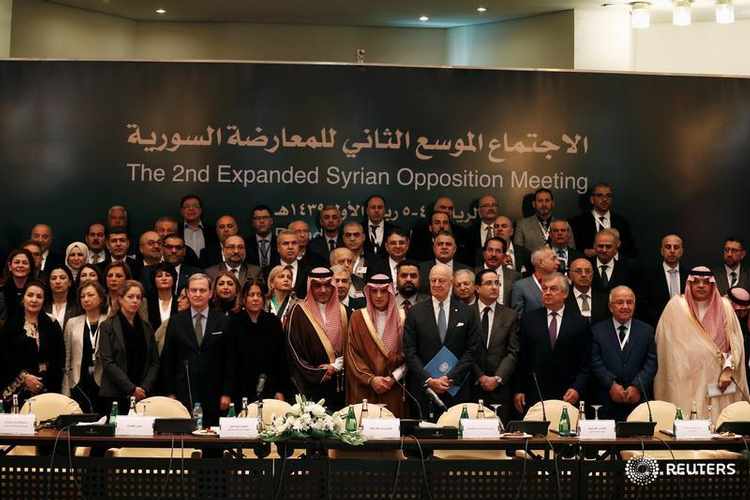“The participants stressed that [the transition] cannot happen without the departure of Bashar al Assad and his clique”
LATEST
- 3 Hungry Children Killed, Dozens of Residents Poisoned From Salt-Like Substance in Besieged East Ghouta
- After Russia Meetings, Turkey’s Erdoğan Declares Agreement on No Place for Kurdish PYD
FRIDAY FEATURE
Iran Daily: Revolutionary Guards — We Are Staying in Syria
After a conference in Saudi Arabia, Syria’s opposition has announced a unity agreement for a new bloc and maintained its demands that Bashar al-Assad leave power.
More than 140 participants elected 50 members to a reformed High Negotiations Committee. On Friday they will name the delegation for the next round of UN-sponsored talks in Geneva.
“The Syrian opposition has sent a message that it is ready to enter serious direct talks over a political transition in Syria and has a unified position and a vision for the future of Syria,” spokesman Ahmad Ramadan said.
Before the meeting, members of the main opposition — the umbrella Syrian National Coalition and the original High Negotiations Committee, created in a Riyadh meeting in December 2015 — had put a question mark over this week’s conference. They expressed concern that it would retreat from the insistence on Assad’s departure and objected to the inclusion of the “Moscow group”, a smaller faction backed by Russia. The head of the HNC, former Prime Minister Riad Hijab, and other senior members resigned.
But in the end, the members who went to Saudi Arabia accepted both the Moscow group and another faction, the Cairo group, including Jihad Makdisi, the former spokesman for the Assad regime. Doing so, they met the demand of UN envoy Staffan de Mistura for a wider bloc before renewal of the Geneva talks.
“We agreed with the group of components present here in Riyadh and the Cairo and Moscow platforms on the formation of one delegation to participate in direct negotiations in Geneva in a few days,” spokeswoman Basma Qadmani said.
“Radical Political Transition”
However, the Moscow and Cairo groups acceded to the call for a Syria which will not be ruled by Assad.
“The participants stressed that [the transition] cannot happen without the departure of Bashar al Assad and his clique at the start of the interim period,” the conference communiqué declared.
It also called for the full withdrawal of the Iranian-led foreign militias and Hezbollah, who have propped up the Assad regime’s military since 2012, saying they fed “terrorism and sectarian strife” between Sunni and Shia Muslims.
The participants focused on the bombing of civilian areas, protracted sieges, and mass detentions of the regime. They backed the Geneva process for “a radical political transition” from an “authoritarian system” to a democracy with free elections.
3 Hungry Children Killed, Dozens of Residents Poisoned From Salt-Like Substance in Besieged East Ghouta
Three children were killed and dozens of residents poisoned in besieged East Ghouta near Damascus, after people residents rushed to purchase and consume what they thought was cheap table salt.
About 30 residents in the town of Zamalka were treated for symptoms including vomiting and severe abdominal pain on Wednesday, said Dr. Walid Awata, director of the local hospital treating the patients. Three children died during treat.
With the Assad regime tightening a four-year siege, many East Ghouta residents are “consuming expired food, animal fodder, and refuse,” the World Food Programme said this week. Others go days without eating, with parents having chidren eat on alternate days to conserve resources.
See Starving and Dying in Besieged East Ghouta
The cost of basic goods such as sugar and salt is now “the price of gold,” Fayez Araabi, spokesperson for the opposition’s Directorate of Health in Damascus and Rural Damascus, said on Thursday.
After Russia Meeting, Turkey’s Erdoğan Declares Agreement on No Place for Kurdish PYD
After meeting Russian and Iranian Presidents Vladimir Putin and Hassan Rouhani in southern Russia on Wednesday, Turkish leader Recep Tayyip Erdoğan has proclaimed agreement that there is no place for the Kurdish Democratic Union Party (PYD) in political discussions over Syria’s future.
Russia had initially proposed inviting Kurdish groups to a “People’s Congress” to advance a political resolution, but Turkey objected. Ankara views the PYD and its YPG militia as part of the Turkish Kurdish insurgency PKK. Erdoğan said Thursday:
We discussed the issue of the Syria national dialogue congress in detail. We, as three countries, will decide on who will be invited to the congress. Sub-commissions established by our foreign ministries will make the necessary studies beforehand.
The President claimed that “Putin shares our sensitivity about the PYD and the YPG….He talked about the negative view of Assad against the PYD-YPG. He mentioned that [Assad] does not want the PYD-YPG on the table either. This is not so surprising.”
The Kremlin was more reserved in its comments. Spokesman Dmitry Peskov said Thursday:
We know that there are certain reservations on the part of our Turkish partners with regards to the forces they believe pose a threat to their national security.
But this does not mean that work will not be conducted. Intense expert work to agree and check the lists [of congress participants] lies ahead.
Erdoğan pressed farther by saying that Wednesday’s meeting in Sochi was very important regarding the “Afrin issue”, the Kurdish canton in northwest Syria.
Erdoğan has promised that the Afrin canton will be eliminated, but Russia has deployed forces in the area to check any Turkish operations.
Yesterday Erdoğan said the “original residents” of Afrin have begun to return to the region and the demographic structure of the town has been returning to the “original structure of the town [which] consists of 50% Arabs, 30% Kurds, and the rest are Turkmens.”

